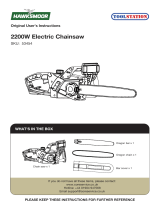
2
Keep cables away from heat sources, sharp edges, or moving parts. Damaged or entangled
cords increase the risk of electric shock.
d. When using power tools or charging your batteries outdoors, use an external cord for
outdoor use, which can reduce the risk of electric shock.
e. If using power tools in a wet environment is unavoidable, Residual Current Devices (RCD)
should be used, which can reduce the risk of electric shock.
3) Personal security
a. Stay alert, pay attention to operation when operating power tools. Do not use power tools
when you are tired or not in full power. Momentary negligence while operating a power tool
can result in serious personal injury.
b. Wear personal protective equipment and always wear safety goggles and devices. For
example, wear a dust mask, non-slip safety boots, hard hats, hearing protection devices,
etc., under appropriate conditions, to minimize personal injury.
c. Avoid accidental starting and make sure the switch is in the OFF position when connecting
the power supply/battery holder, or when lifting or moving the tool. Putting fingers into the
switch that is on or inserting the plug while the switch is on can be dangerous.
d. Remove all adjusting wrenches and wrenches before turning on power tool. Any wrench left
in the rotating parts of the power tool can cause personal injury.
e. Hold the tool firmly and always pay attention to your footing and body balance, so that the
power tool can be well controlled in case of accidents.
f. Dress appropriately. Do not wear loose clothing or accessories. Keep clothing, gloves, and
hair away from moving parts. Loose clothing, accessories, or loose long hair can get into
moving parts.
g. If devices are provided to connect to chip removal and dust collection equipment, ensure
that these devices are properly connected and used correctly. The use of such devices can
reduce the risks caused by dust.
4) Use and precautions of power tools
a. Do not abuse power tools. Select the appropriate ones according to the purpose. Properly
designed power tools will make your work more effective and safer.
b. If the switch cannot connect or disconnect the power supply to the tool, the power tool
should not be used. Power tools that cannot be controlled with switches are dangerous and
should be repaired.
c. Before any adjustment, replacement of accessories, or storage of the power tool, the plug
must be removed from the power source or the battery must be disconnected from the tool.
This protective measure will reduce the risk of accidental starting of the tool.
d. Store idle power tools out of the reach of children and do not allow anyone who is not
familiar with power tools or who does not understand these instructions to use them. Power
tools are dangerous when used by untrained people.
Safety warnings for rechargeable chainsaws
1) Keep all parts of the body away from the operating chainsaw. Before starting the chainsaw, make
sure that the chain does not touch any object. Any minor distraction during an operation can result in
clothing or body dragging on the chain.
2) Hold the chainsaw correctly for safety. Otherwise, the risk of personal injury could be greater.
3) Since the chain can come into contact with hidden wires, only the insulated handle can be grasped
when operating the tool. If the chain touches any live/charged wires, the exposed metal part of the
tool can also become charged and electrify the operator.
4) Wear safety glasses and hearing protection devices. It is also recommended to use protective
devices to protect the head, hands, legs and feet. Full protective clothing will reduce personal injury
from debris or accidental chain contact.
5) Do not operate the chainsaw in the tree. Personal injury can occur when operating the chainsaw in




















